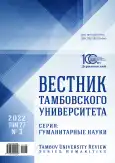Actualization of learning in the natural environment from the standpoint of environmental safety
- Authors: Alisov E.A.1
-
Affiliations:
- Moscow City University
- Issue: Vol 27, No 3 (2022)
- Pages: 637-645
- Section: PEDAGOGY OF SECONDARY AND PRESCHOOL EDUCATION
- URL: https://bakhtiniada.ru/1810-0201/article/view/298240
- DOI: https://doi.org/10.20310/1810-0201-2022-27-3-637-645
- ID: 298240
Cite item
Full Text
Abstract
The pedagogical aspects of full-scale use in modern educational practice of teaching in the natural environment are considered, the potential advantages of its organization are indicated (against the background of the statement of the impoverishment of the natural environment of a developing personality). Empirical data showing the correlation of learning in the natural environment with the parameters of environmental safety are presented. The respondents were pupils of a boarding school of three age groups: primary school students, teenagers and high school students. A two-component system of indicators and criteria is applied: the indicator of saturation of the educational environment – the criterion of sufficiency and the indicator of the structuring of the educational environment – the criterion of concentration and intensity. As a variant of the methodological basis for optimizing the interaction of the individual and the surrounding world, a video-ecological approach is designated, constructed on the basis of the meaningful filling of epistemic spaces (paradigms, syntagmas, pragmatics). From the standpoint of the implementation of the video-ecological approach, the tendencies of personalization of the educational environment, increasing the level of visual literacy of participants in educational relations are characterized. The general regularities of the ecologization of environmental characteristics and the possibility of applying in practice various forms of education in the natural environment, which is considered as an alternative to the traditional educational space of the school, are substantiated. Positionally formulated advantages of the organization of the modern educational process in the natural environment are given.
Keywords
About the authors
E. A. Alisov
Moscow City University
Author for correspondence.
Email: evgenii.alisov@mail.ru
ORCID iD: 0000-0001-9335-8172
Doctor of Pedagogy, Professor, Professor of Pedagogy Department of Institute of Pedagogics and Psychology of Education
4-1 2-y Selskokhozyaystvennyy Dr., Moscow 129226, Russian FederationReferences
- Afonina R.N., Lesnykh E.A. Printsip prirodosoobraznosti v sovremennoy obrazovatel’noy praktike [The prin-ciple of natural conformity in modern educational practice]. Colloquium-Journal, 2019, no. 25-5 (49), pp. 42-43. (In Russian).
- Knyazeva M.D. Ekologizatsiya obrazovaniya i innovatsionnyye protsessy [Ecologization of education and innovation processes]. Slavyanskiy forum [Slavic Forum], 2019, no. 1 (23), pp. 131-137. (In Russian).
- Chvanova M.S., Anuryeva M.S., Lyskova V.Y., Kotova N.A., Molchanov A.A. Podgotovka spetsialistov v ob-lasti informatsionnoy bezopasnosti: innovatsionnyy podkhod k formirovaniyu obrazovatel’noy sredy [Training of specialists in the field of information security: an innovative approach to the formation of the educational environment]. Psikhologo-pedagogicheskiy zhurnal «Gaudeamus» – Psychological-Pedagogical Journal “Gaudeamus”, 2015, no. 1, pp. 18-31. (In Russian).
- Alisov E.A. Tekhnologii otsenki kachestva osvoyeniya novykh moduley pedagogicheskoy magistratury [Tech-nologies for assessing the quality of mastering new modules of pedagogical magistracy]. Sovremennyye proble-my nauki i obrazovaniya – Modern Problems of Science and Education, 2015, no. 2-1, art. 472. (In Russian).
- Odinokov A.S. Teoretiko-metodologicheskiye podkhody k formirovaniyu mezhdistsiplinarnykh svyazey [Theo-retical and methodological approaches to the formation of interdisciplinary links]. Pedagogicheskiy zhurnal – Pedagogical Journal, 2021, vol. 11, no. 4-1, pp. 79-87. https://doi.org/10.34670/AR.2021. 53.55.058. (In Rus-sian).
- Faley M.V. Razvitiye teorii i praktiki issledovatel’skogo obucheniya [Development of the theory and practice of research education]. Uchenyye zapiski Sakhalinskogo gosudarstvennogo universiteta [Scientific Notes of Sakhalin State University], 2020, no. 15-16, pp. 101-104. (In Russian).
- Konysheva A.V., Bigacheva E.N. Innovatsionnyye i informatsionnyye tekhnologii v obrazovanii kak metod praktikooriyentirovannogo podkhoda k obucheniyu [Innovative and information technologies in education as a method of practice-oriented approach to learning]. Elektronnyy nauchnyy zhurnal [Electronic Scientific Journal], 2021, no. 9 (47), pp. 18-22. (In Russian).
- Bayeva I.A. Psikhologicheskaya bezopasnost’ obrazovatel’noy sredy v strukture kompleksnoy bezopasnosti obrazovatel’noy organizatsii [Psychological safety of the educational environment in the structure of the complex safety of an educational organization]. Kazanskiy pedagogicheskiy zhurnal [Kazan Pedagogical Journal], 2017, no. 6 (125), pp. 12-18. (In Russian).
- Dmitriyeva T.M. Osnovy sensornoy ekologii [Fundamentals of Sensory Ecology]. Moscow, RUDN University Publ., 1999, 168 p. (In Russian).
- Filin V.A. Videoekologiya. Chto dlya glaza khorosho, a chto – plokho [Videoecology. What is Good for the Eye and What is Bad]. Moscow, Videoekologiya Publ., 2006, 512 p. (In Russian).
Supplementary files









